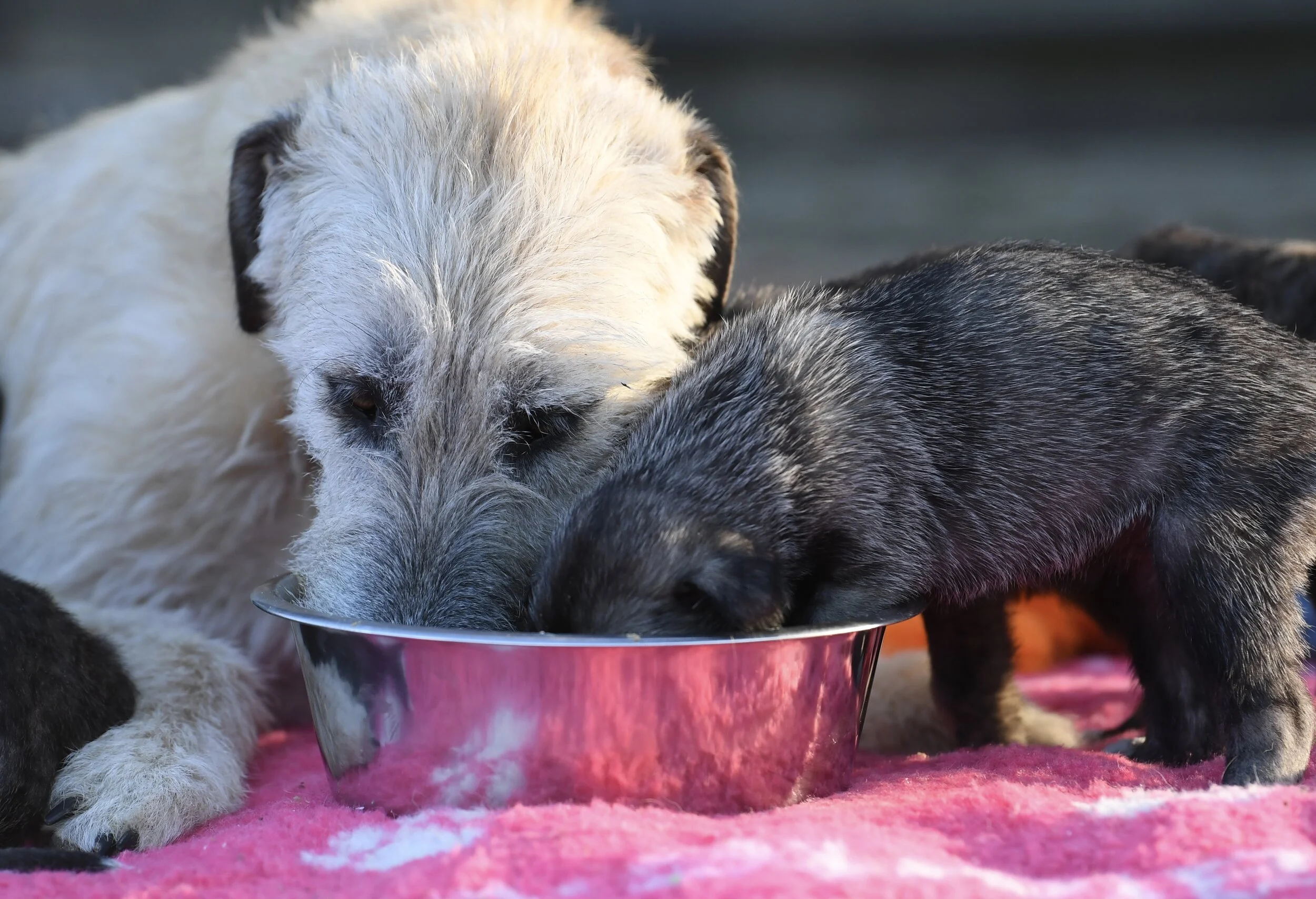


Contact
The Bonaforte Kennel
Ashbourne, Derbyshire
Contact
The Bonaforte Kennel
Ashbourne, Derbyshire
Email us with any pet food queries:
woof@bonaforte.dog
Please note: we currently have no litters planned, but please email us to be added to the waitlist.
Send us an email

Irish Wolfhound Resources
Irish Wolfhound Resources
Registered with the Charity Commission, the Irish Wolfhound Charitable Trust (IWCT) provides a formal, secure and accountable platform for anyone wishing to donate/bequest monies to a full array of Wolfhound related causes, including Irish Wolfhound Rescue and the Irish Wolfhound Health Group.
Excessive Paw Licking in Dogs – It May Not Be Allergies
For any practicing veterinarian, paw licking and chewing is a very common complaint and often, even with holistic approaches can be difficult to treat. Conventionally, this is considered an allergic response.
Most dogs are taken through a battery of tests, put on hypoallergenic and elimination diets, and repeated and long term antibiotics. Many end up on corticosteroids. Unfortunately, many of these dogs continue licking. Follow the link to find out what might be the true cause.
Irish Wolfhound Health: Membership of the database is simple and users are invited to upload a scan of a current heart test certificate for one of their Wolfhounds. Once this data has been verified by the administrators, the owner will be given membership status and can then access all other data on the database. Publish your heart test results here.
Dogs at Christmas
From your dog's perspective, Christmas is a time of the year when lots of unusual and exciting things are brought into your home, making it a very tempting time for them to get up to all sorts of mischief. Interesting foods, unusual plants and trees, attractive decorations and Christmas presents will all be of great interest to your dog, but some of these things may be harmful if eaten.
- See more at: http://www.thekennelclub.org.uk/health/dogs-at-christmas
Hilary Jupp's Comprehensive Guide - This site as comprehensive as possible; covering the attributes and characteristics of the Irish wolfhound; its care, including nutrition, exercise, and training; its health and the major disorders to be found in the breed, and how best to deal with them particularly with regard to alternative therapies.
To Vaccinate or not to Vaccinate - Pet owners are becoming increasingly aware of the long period of duration for vaccines and are vaccinating every three years, or not vaccinating their adult or senior dogs at all. Although it is becoming increasingly obvious that yearly boosters – or any boosters – are at best unnecessary and at worst harmful, the risks and benefits of puppy vaccination are much less clear. If you choose to vaccinate your puppy, you can limit (but not eliminate) the vaccine damage in your puppy by understanding a few things about vaccines and immunity.
Puppy Mouthing - Mouthing is a normal behaviour in puppies and often disappears by the time the puppy is between four and five months of age. Many puppies continue to bite after that simply because biting is inadvertently rewarded. Many common corrections for biting are seen as rewarding for puppies because they involve interaction which is what he wants. Although I don't condone the tying up on a rope and can't see the aim of this!!!
Kennel Cough - the natural prevention of a canine cold. If your dog is fed appropriately, and you avoid repeated vaccinations like the plague, stay away from toxic things like flea control spot ons and heartworm monthly pills, odds are he’ll never get this canine “cold” known as kennel cough.
Pneumonia in Irish Wolfhounds - It is becoming apparent that diagnosising pneumonia in wolfhounds is not easy, and if your hound does have pneumonia it is the speed in which you can get the right treatment which is crucial. This article written by the Irish Wolfhound Health Group is very informative. http://www.iwhealthgroup.co.uk/pneumonia.html
Irish Wolfhound Puppy - The Irish Wolfhound Health Group have written a very information guide about caring or your Irish Wolfhound Puppy. It is a free guide and available for you to download from here: http://www.iwhealthgroup.co.uk/guide.html There is no charge for this excellent Irish Wolfhound Puppy Guide but they say donations are most welcome.
Irish Wolfhound Rescue Trust - Think carefully before you decide to share your home with an Irish Wolfhound, he is not as other dogs. He is the King amongst dogs and will rule your life completely. Everything will change; your life, your house, your car, will be totally re-arranged around him. Wolfhounds are kindly, tolerant dogs, gentle by nature, but do not be misled by the Gentle Giant image; a young hound can be boisterous with great personality. Great care must be taken, particularly with small children, who can easily be knocked over, albeit unintentionally, and badly hurt. Wolfhounds do not realise just how big they are. for more information and to continue reading this exert following the link: http://www.wolfhoundrescue.org.uk
- Champdogs - Irish Wolfhound Section
- Champdogs - Main Site
- Von der Oelmühle - Irish Wolfhounds
- The Puppy Plan
- The Kennel Club Assured Breeder Scheme
- Holiday in Port Isaac - Pets Welcome, especially Irish Wolfhounds. Large garden and paddock, with access to fresh water. Safe and secure to let your Wolfhound run around.
- Irish Wolfhound Health Group
- Irish Wolfhound Club
- Irish Wolfhound Puppies
- Irish Wolfhound Rescue
DOGS TRUST LIST OF POISONOUS PLANTS, GARDEN AND HOUSEHOLD SUBSTANCES Not a complete list of all poisonous plants and is only intended as a guide. Please contact your veterinary surgeon for advice or treatment immediately if you think your pet has eaten any of the following plants and is showing a bad reaction. Your pet may also have a sensitivity or allergy to a plant that is not on the list, so always be vigilant and seek help if you are worried about your pet’s health.
IW World Is the official publication of the Federation of European Irish Wolfhound Clubs, E.I.W.C.. As such, its mission is to share information between member nations, and by extension, provide information of interest to IW breeders and owners worldwide.
Physiotherapy for dogs, still an unknown factor - this article is well worth reading and gives you some interesting insights to irish Wolfhound ailments.
Portosystemic shunt – persistent ductus venosus – in the Irish Wolfhound - a more in depth article about PSS: causes, signs, symptoms and treatments.
Back in the early 1990s Australian veterinarians Drs Tom Lonsdale, Breck Muir and Alan Bennett introduced a simple idea with profound global implications: Raw meaty bones promote pet health , more information and books on the subject visit raw meatybones.com
Dr Jean Dodd, considered to be one of the leading experts on pet healthcare. This is a very interesting blog about especially about pet gut health.
Talking Allergies: itchy skin, red and watery eyes, sneezing, runny nose. Allergies are a pain, and not just for us humans.
Accupressure points for bloat: This procedure is not recommended instead of veterinary treatment, but begun early, or on the way for veterinary treatment, can save your hound’s life
Antibiotics for the Irish Wolfhounds - an interesting read explaining about different antibiotics and uses.
The AHT has been investigating seasonal canine illness (SCI) since September 2010.
Cases of this mystery illness are generally seen between August and November. SCI can affect dogs of any size, shape or sex and it causes dogs to become very ill, very quickly after being walked in woodland.
Kuranda Dog beds we have found these beds to be not only large enough but durable, clean and light. Our hounds not only love them but have been unable to destroy them!
Over the years, our observations of the kennel populations of giant breeds and their siblings living in private homes have led to the conclusion that there is no such thing as congenitalunilateral hip dysplasia, but only acquired unilateral hip dysplasia. The kennel dogs, whose exercise opportunities are maximized, with several dogs of a similar age free to run and play all day and night in large paddocks, show us some interesting things.
- They grow much more slowly, because much of their food intake goes into play and running.
- They rarely (almost never) suffer an injury.
- They always have symmetrical hip sockets, even if they are very shallow.
Their litter mates in private homes, where exercise is confined to an hour or two of intense play or jogging when their owners return from work, provide us with a different set of observations.
- They grow very large, very fast.
- They often suffer injury.
- They frequently have hip sockets of different depths.
The implications of these observations are enormous, but very simple to understand. These large breeds grow much too quickly for their biology to keep up. They frequently show some degree of clinical rickets with some bowing of the forelegs, and have large soft joints due to the inability of the body to deposit calcium in the bone at a rate equal to the rate of growth. They often show uneven growth, with the rear end growing over a few weeks, then the front end trying to catch up. As the rear leg assembly grows disproportionately, and the puppy is 'high in the rear', the mechanical leverage that the muscles are able to exert across these straighter angles is much reduced. The result of this is a decreased ability of muscle to protect joints from injury.
The owners of giant breed pets tend to overfeed their puppies, having with the best of intention, the inner desire to see a 'big dog' and to do nothing which might risk the dog not attaining the greatest possible size. Try as they may, some owners are just unable to restrict their puppy's diet. Owners are cautioned that their puppy needs a good deal of exercise, but their work schedules often conflict with their desire to do this. The result is a period of intense exercise. A 3 mile run, or a half hour of Frisbee. When a single puppy who lies around all day welcomes his owners in the evening, he is ill prepared for either intense exercise, or the uncertainty of footing on slippery floors and his always changing joint angulation. His muscle tone is a small fraction of that of a puppy which plays with other active dogs all day long. The result is an injury.
For more information follow this link:
Coconut Oil - For some of us, coconuts conjure up images of palm trees and tropical locales. For others, they take us back to mouth-watering memories of our mother’s home-baked coconut cream pie – or even the sweet, gooey center of our favorite childhood candy bar! But did you know that besides tasting delicious, the oil pressed from the meat of the coconut contains numerous health benefits, for people and companion animals? Let’s take a closer look at coconut oil and why you should consider adding some to your pet’s diet.
New Page
New Page
